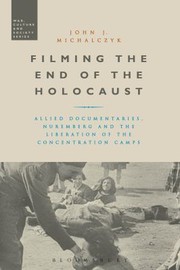- Summary
- Filming the End of the Holocaust considers how the US Government commissioned the US Signal Corps and other filmmakers to document the horrors of the concentration camps during the April-May 1945 liberation. The evidence of the Nazis' genocidal actions amassed in these films, some of them made by Hollywood luminaries such as John Ford and Billy Wilder, would go on to have a major impact at the Nuremberg Trials; they helped to indict Nazi officials as the judges witnessed scenes of torture, human experimentation and extermination of Jews and non-Jews in the gas chambers and crematoria. These films, some produced by the Soviets, were integral to the war crime trials that followed the Holocaust and the Second World War, and this book provides a thorough, close analysis of the footage in these films and their historical significance.
- Series
- War, culture and society
War, culture and society.
- Format
- Online resource
- Author/Creator
- Michalczyk, John J., 1941-
- Published
- London ; New York : Bloomsbury Academic, 2016
- Contents
-
Introduction
Prelude to Nuremberg : the Allies seek justice
The US Signal Corps encounters atrocities
The British liberation of Bergen-Belsen : memory of the camps (1945/1985)
The Soviets en route to Nuremberg
Film as visual documentation at the Nuremberg trials
The French connection to Nuremberg
Post-Nuremberg
Epilogue
Notes
Chronology
Holocaust film bibliography
Nuremberg trials bibliography
Filmography.
- Notes
-
Includes bibliographical references (pages 193-200), filmography (pages 201-204) and index.
Introduction -- Prelude to Nuremberg : the Allies seek justice -- The US Signal Corps encounters atrocities -- The British liberation of Bergen-Belsen : memory of the camps (1945/1985) -- The Soviets en route to Nuremberg -- Film as visual documentation at the Nuremberg trials -- The French connection to Nuremberg -- Post-Nuremberg -- Epilogue -- Notes -- Chronology -- Holocaust film bibliography -- Nuremberg trials bibliography -- Filmography.




